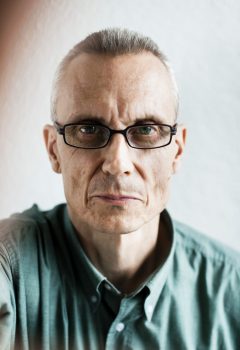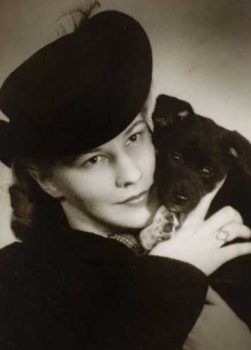Author: Erkka Lehtola
Words and silences
Issue 1/1991 | Archives online, Authors
A collection of poems and photographs by the Finnish Lapp artist Nils-Aslak Valkeapää is an uncompromising statement of the culture of one of Europe’s last truly local peoples
After its supersonic journey across the skies, Concorde lands at Rovaniemi airport. The steel bird disgorges its cargo: rich Europeans on a day trip to Lapland. Among them are a few even more long-distance travellers, from Japan.
Father Christmas greets them cordially. They visit the Arctic Circle. They eat in the frosty outdoors, in front of a roaring campfire. They ride in a reindeer sled. It is the exotic experience they have hoped for; they laugh for the pleasure of it. More…
Family crimes
Issue 4/1990 | Archives online, Authors
Olli Jalonen’s novel Isäksi ja tyttäreksi (‘Becoming father and daughter’), one of the shortlisted books for the 1991 Finlandia Prize, is set across Europe in 1999. Introduction by Erkka Lehtola
Olli Jalonen (born 1954) is one of those authors who have brought Finnish literature out of the forests and into the cities – even into the nuclear shelters. Unien tausta (‘A background of dreams’) won a short story competition run by the publishing house of Otava, and was published in 1978. His first novel, Sulkaturkki (‘Coat of feathers’) appeared in 1979, to be followed by Ilo ja häpeä (Joy and shame’, 1981), Hotelli eläville (‘A hotel for the living’,1983), Johan ja Johan (‘Johan and Johan’, 1989) and the story-novel Tuhkasaari (‘Ash Island’, 1987). Jalonen was awarded the Eino Leino Society Prize this year; Johan ja Johan was on the shortlist for the Finlandia Prize. More…
Life and letters
Issue 3/1989 | Archives online, Authors, Interviews
Meeting grey-suited Jarkko Laine on a Helsinki street, few would guess that he is a poet. His black briefcase seems more likely to contain accounts and computer printouts than Chinese poems or short stories by Raymond Carver. Few would imagine, either, that this friendly, smiling, gentle poet chairs the Finnish Writers’ Union, a post he has held since 1987.
And even fewer would guess that this is the most characteristic poet of post-war Finland, an ‘urbanist’, ‘child of Marx and Coca-Cola’, ‘mouthpiece for his generation’, ‘Nordic beatnik’, ‘the Gladstone Gander of Finnish literature, who succeeds in everything he sets his hand to’…
‘Sometimes it seems to me that people still brand me as a young poet,’ says Jarkko Laine, whose work is prolific and diverse: poetry, prose and journalism, in his capacity as editor-in-chief of the literary journal Parnasso. More…
Far from the world
Issue 1/1989 | Archives online, Authors
The narrow, icy road winds its way up to the small village. There are just a few houses, and scarcely two dozen inhabitants, all of them Swedish-speaking. It is many hundred kilometres to Helsinki, but nearby are a few very small, Swedish-speaking towns.
This is a Finland that Finns themselves do not know. Only a few travel here – and the people who live here do not like to go anywhere.
The poet Gösta Ågren, 52, is one of the villagers. All the other inhabitants are his childhood friends. Gösta Ågren is no different from the others. Even his house is just as unassuming as the rest, for this is not prosperous country. He built his house himself, painted it yellow and red and decorated its interior timbers with inscriptions of a kind generally found in Dalecarlia in Sweden. Gösta Ågren was born in the place where he built his house. More…
The comi-tragedist
Issue 2/1988 | Archives online, Authors
Early March, Rome. Mimosas and cherries are in bloom. Few tourists are about as yet. On a street corner close to the Spanish Steps I bump into Juhani Peltonen. He and his family have been to see Pompeii the day before. We agree to meet again back in Finland.
The journey into the world of Juhani Peltonen passes through clean, white snow. Two big dogs are barking in the garden of the yellow house. They are familiar from Peltonen’s books. The dogs are as friendly as their master.
In the house there are many rooms, many beautiful things, many paintings, framed book jackets and theatre programmes, books, books, books, an old-fashioned typewriter that is still in use, an aged grand piano, flowers. The stuffed birds on top of the book case are so lifelike that they look as if they have just alighted for a second to listen to our conversation before flying off again.
This is not just a house. It is also a fantasy world. In these spacious rooms it is easy to believe that Juhani Peltonen began his career as a romantic with leanings towards surrealism. More…
Keeping silence
Issue 4/1987 | Archives online, Authors
The October sunlight filters through the dense pine forest. Nature is completely silent, waiting for winter.
Through the open window over the forest and the lake floats the sound of an old grand piano, made in St Petersburg in the days of the Tsars, a tiny, exquisite fragment of Tchaikovsky.
Mirkka Rekola is playing the piano. For her aphorism has become reality. In her book Silmänkantama (‘As far as the eye can see’), she wrote: ‘Trees like delirium, myself in twilight mood, I open the door, the forest is inside the house.’ In these days of voracious publicity, Mirkka Rekola is an unusual and estimable figure in the Finnish media circus: she does not give interviews, does not open her home to the media, does not appear on chat shows or take part in other public entertainments. She avoids being photographed, shunning the camera as she shuns all other journalistic intrusions. More…
Short and sharp
Issue 4/1987 | Archives online, Authors

Juha Seppälä. Photo: WSOY
The latest development in Finnish literature has taken a couple of decades to emerge. Instead of the long, epic prose that was so popular for so long, we now have short fiction that often takes the form of the short story. Descriptions of country surroundings and vanished ways of life have been supplanted by prose that pulsates to the rhythm of the city.
At the same time the image of the writer has changed. Today’s young Finnish author is not an amateur or someone who is forced to make his living by other means; he is often a highly educated professional writer with a grasp of many new and diverse fields of knowledge.
Juha Seppälä (born 1956) is a good example of this changed author type. He is a graduate of Turku University in Finnish literature and cultural history. He has never worked in, for example, a school or, indeed, had any other steady job. His job is writing, and he works to a strict regime, for there is much to be done: Seppälä has written many radio plays, television scripts and two collections of short stories which have had a very positive critical reception. He also writes literary criticism for a number of newspapers, including a weekly column for Aamulehti, one of Finland’s biggest daily papers. More…
Portraits of change
Issue 1/1987 | Archives online, Authors, Interviews

Eeva Joenpelto. Photo: Tyyne Havia / SKS Archives
Erkka Lehtola interviews Eeva Joenpelto
You can see Eeva Joenpelto’s house from a long way off: a substantial red-painted building in the southern Finnish village of Sammatti. It is the kind of house rich Finnish farmers lived in in days gone by.
The farmyard is big; behind the hedge loom the neighbouring fields and the blue mushroom woods of autumn. In the flower beds are roses and ornamental plants; the red farmhouse breathes the old Finnish countryside tradition.
But there has been no farming in the red house’s fields and meadows for a long time now. Eeva Joenpelto moved from the capital to these peaceful country surroundings just a few years ago.
All the same, the red house, the well-kept yard and forest and cornfields nearby have an important significance: for in many of her novels Eeva Joenpelto, the writer who has moved to the country, describes a huge shift in Finnish society. Many of her novels show the disintegration of the old Finnish agrarian society, and the industrial Finland, that creation of supply and demand, taking its place. More…
-
About the author
From the early 1960s onward, the journalist and author Erkka Lehtola (1937–1995) worked at the daily paper Aamulehti, published in Tampere, becoming the head of its cultural section in 1976. He published four books on journalism, cinema and Poland, which were among his many special interests. As the Editor-in-Chief of Books from Finland (1990–1995) Lehtola substantionally renovated the journal; his editorship ended in his death in a car accident in Lapland in 2005.
© Writers and translators. Anyone wishing to make use of material published on this website should apply to the Editors.
